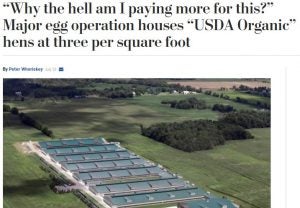As I’ve written about many times before, many food labels are false or misleading. There’s no such thing as added hormones in poultry or pork, all meat is antibiotic-free, and “organic” does not mean pesticide free. But recently I read this article in The Washington Post, and I had to question how truthful it was. Usually if an article is full of hyperbolic claims, fearmongering, and over-the-top info written by someone with no agricultural background, I would raise a skeptical eyebrow regardless of whether I agree with the article.
The premise of the article is: Why am I paying more for this? — in terms of organic egg production at Eggland’s Best. The author claims hens are crammed in the barns at three per square foot with no specific access to the outdoors. But a couple red flags besides the clickbait-type headline motivated me to contact the company directly to hear their rebuttal. One of these red flags is the fact that the author cited the Organic Consumers Association (OCA) and the Cornucopia Institute. As a farmer I can say that these organizations have an agenda and what they speak about non-organic agriculture couldn’t be further from the truth. They are famous for conspiracy theories and for using fear and misinformation to line their pockets. Not only do they lie about GMOs, but they’ve also been known to slander organic food companies that don’t give them money.

Herbruck’s Poultry Ranch is one of the farms that supplies organic eggs for Egglands Best, which doesn’t appear to have ties to OCA. After contacting them for a rebuttal, I was sent this link: “In-line organic egg complexes unjustly criticized.” This to me seems like a much more balanced report, doesn’t it? As I’ve written about before here, marketing labels for eggs aren’t always what they seem. On a larger scale, generally the enriched cage systems provide the best care in terms of animal welfare from a science-based perspective, while reducing the risk of mortality, salmonella, and predation, among other things. This is why over 90 percent of egg laying chickens are raised in these conventionally caged systems; to be affordable and efficient, according to world-renowned animal welfare experts such as Temple Grandin. Without these economies of scale, eggs would be substantially more expensive as well.
According to this report from chick-cite.com, The Washington Post article was a blatant attempt at eliminating a competitor. What do you think, did it work? After having conversations with Herbruck’s as well as their PR firm, I’ve learned Eggland’s best isn’t one to jump into the debate. They’re a little more conservative and don’t want to get into specifics. Regardless, at the end of the day their farm does comply with organic standards. It is not uncommon, particularly in colder climates, for organic chicken barns to have sunlights or screened porches rather than “outdoor access.” This is better for their health, food safety, weather issues, and predators. It is interesting, however, that there are no specific spacing requirements for hens in organic barns. So is The Washington Post article justified? Perhaps.
I understand Eggland’s Best doesn’t want to get involved with The Washington Post article, but they really didn’t have much to say other than the fact that it’s organic certified. Different agencies can certify, while some seem to have stricter standards than others. Just goes to show that marketing buzzwords may not be what they seem.
In a day where consumers want transparency it is a bit disheartening to me to not hear much of a rebuttal from Herbruck’s (Eggland’s Best organic) to solidify their position. If we as an industry don’t defend our positions, show transparency, and educate, where does that leave their integrity? Will activists keep pushing harder if they can get away with it? What will it take to get them to be more proactive instead of reactive? This is a big reason why it is so important for people in agriculture to tell their stories and make their practices more well known.
Michelle Miller, the Farm Babe, is an Iowa-based farmer, public speaker and writer, who lives and works with her boyfriend on their farm which consists of row crops, beef cattle, and sheep. She believes education is key in bridging the gap between farmers and consumers.



